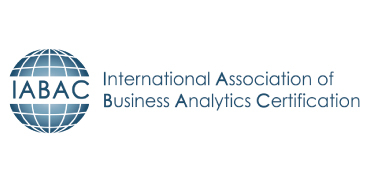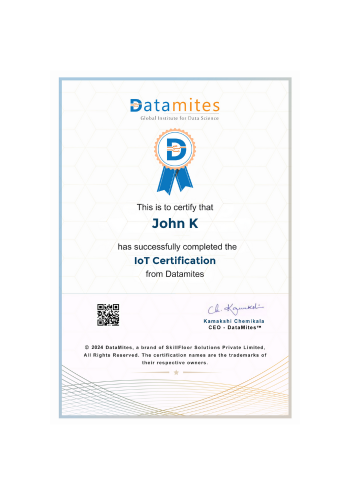Instructor Led Live Online
Self Learning + Live Mentoring
In - Person Classroom Training
The entire training includes real-world projects and highly valuable case studies.
IABAC® certification provides global recognition of the relevant skills, thereby opening opportunities across the world.
IoT stands for Internet of Things. It refers to the network of physical devices, vehicles, appliances, and other objects embedded with sensors, software, and connectivity that enables them to connect and exchange data over the internet.
IoT connects devices through the use of wireless technologies such as Wi-Fi, Bluetooth, and cellular networks. These devices are equipped with sensors and actuators to collect data and perform actions, which are then transmitted and shared over the internet, enabling communication and interaction between the devices.
Some common examples of IoT devices used in everyday life include smart thermostats, wearable fitness trackers, home security systems, smart speakers, connected appliances (e.g., refrigerators, washing machines), and even smart lighting systems.
Data collection and analysis are vital in IoT applications because they enable organizations to gain valuable insights from the vast amount of data generated by IoT devices. This data helps in making informed decisions, improving operational efficiency, identifying patterns and trends, and enabling predictive maintenance, among other things.
Some key security challenges and considerations when implementing IoT solutions include device authentication and identity management, data encryption, secure communication protocols, regular software updates and patches, and monitoring for potential vulnerabilities. Privacy concerns and protection of personal data are also significant factors to consider.
In healthcare, IoT enables remote patient monitoring, smart medical devices, and improved access to healthcare data. In agriculture, IoT helps in precision farming, soil and crop monitoring, and efficient resource utilization. In transportation, IoT contributes to smart traffic management, connected vehicles, and fleet tracking, leading to enhanced safety and efficiency.
The main components of an IoT ecosystem include devices or "things" (sensors, actuators), connectivity (networks, protocols), data processing and storage (cloud platforms, edge computing), applications and analytics, and user interfaces (web portals, mobile apps).
IoT enables the concept of a smart home by connecting various devices within the household, allowing users to control and automate them remotely. For example, users can adjust the thermostat, turn on lights, monitor security cameras, or control home appliances through a smartphone app or voice commands.
Some commonly used protocols for IoT communication include MQTT (Message Queuing Telemetry Transport), CoAP (Constrained Application Protocol), HTTP (Hypertext Transfer Protocol), and Zigbee, among others. These protocols facilitate efficient and secure data transfer between devices and IoT platforms.
The salary of a IoT Engineer in India ranges from INR 7,294,50 according to a Glassdoor report.
The C language, often regarded as the foundation of every programming language, remains a crucial programming language for IoT development. According to the 2018 Eclipse Foundation survey, C is the preferred language for developers, boasting a 56.9 per cent overall popularity, second only to Java.
In industrial automation, IoT enables the remote monitoring and control of machinery and processes. This implies that operators can supervise operations from any location globally, utilizing internet-connected devices. This enhances flexibility and enables prompt responses to any issues that may arise.
The primary objective of the Internet of Things (IoT) is to establish connectivity between various devices and objects, enabling them to gather and exchange information while facilitating remote monitoring and control.
Expected Growth of IoT, As per Statista, the projected global market size for IoT in the future is anticipated to reach 1.6 trillion US dollars by 2025, a significant increase from 212 billion in 2019. The surge in IoT is propelled by the rising embrace of smart devices, including watches, refrigerators, home appliances, and sensors across various industries.
The duration of the course is three months, during which students engage in five capstone projects and one client project.
The prerequisites for enrolling in DataMites' IoT training program include basic knowledge of programming concepts and familiarity with any programming language. Prior experience or understanding of electronics and networking can be advantageous but not mandatory.
The course encompasses a wide range of topics, including AI programming, data science packages such as Numpy, Pandas, Sklearn, Scipy, and Matplotlib.
Yes, hands-on projects are an integral part of the IoT training in India at DataMites. Students will have the opportunity to work on practical assignments and build IoT applications using different hardware components and software tools.
Yes, DataMites provides certification upon successful completion of the IoT training course in India. The certificate is widely recognized and can add value to your professional profile.
The mode of Payment are-
DataMites supports students during and after the IoT training program through various means, including:
DataMites offers both online and in-person options for IoT training in India. Students can choose the mode of learning that suits them best.
The teaching methodology in the IoT training in India at DataMites involves a combination of theoretical lectures, practical demonstrations, hands-on exercises, and interactive discussions. Trainers focus on providing a comprehensive understanding of IoT concepts while emphasizing practical application.
Yes, DataMites offers job placement assistance for students completing the IoT training in India. This includes guidance on resume building, interview preparation, and connecting students with relevant job opportunities through their network of industry partners.
DataMites' IoT training in India stands out from other training providers due to several reasons, including:
The IoT training in India at DataMites is designed to cater to a wide range of industries and sectors. The curriculum covers fundamental IoT concepts applicable to domains such as manufacturing, healthcare, transportation, energy, agriculture, and smart cities.
Some examples of real-world applications covered in the IoT training course may include:
Yes, the IoT training in India at DataMites covers both hardware and software aspects of IoT. Students will gain knowledge of various IoT hardware platforms, sensors, and communication protocols, as well as programming languages, cloud platforms, and data analytics tools relevant to IoT applications.
The cost for IoT training in India at DataMites begins at INR 36,000 for the online course, INR 22,000 for the blended learning option, and INR 45,000 for classroom training, respectively.
The DataMites Placement Assistance Team(PAT) facilitates the aspirants in taking all the necessary steps in starting their career in Data Science. Some of the services provided by PAT are: -
The DataMites Placement Assistance Team(PAT) conducts sessions on career mentoring for the aspirants with a view of helping them realize the purpose they have to serve when they step into the corporate world. The students are guided by industry experts about the various possibilities in the Data Science career, this will help the aspirants to draw a clear picture of the career options available. Also, they will be made knowledgeable about the various obstacles they are likely to face as a fresher in the field, and how they can tackle.
No, PAT does not promise a job, but it helps the aspirants to build the required potential needed in landing a career. The aspirants can capitalize on the acquired skills, in the long run, to a successful career in Data Science.





